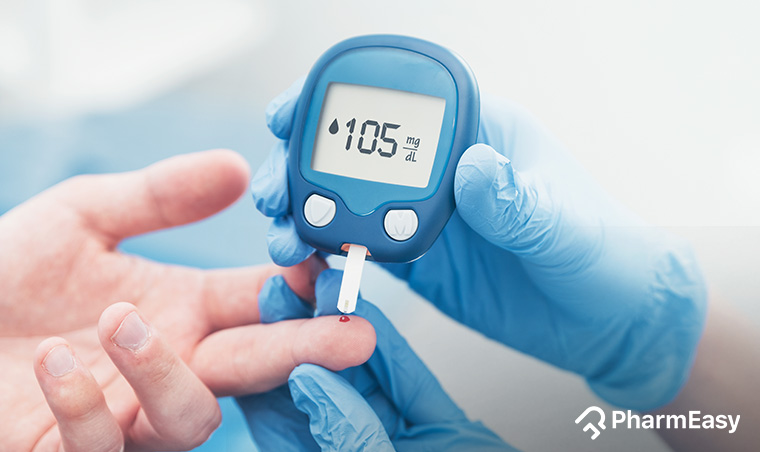Is Diabetes Genetic? Facts You Must Know
By Shantanu Sodhi +2 more

Download PharmEasy App




Register to Avail the Offer
Send OTPBy continuing, you agree with our Privacy Policy and Terms and Conditions
By Shantanu Sodhi +2 more
Diabetes Mellitus (DM) generally tends to run in families. If you have been diagnosed with diabetes recently, it is likely that you will find a history of diabetic relatives in your family tree. The question is – Is diabetes a genetic disease? People with diabetes often wonder about the chances of passing this condition to their children or the likelihood of developing the disease if their parents have it.

Your genes definitely play a role in developing diabetes. Having a family history of diabetes raises your chances of acquiring the condition. However, diabetes mellitus is caused by a host of different factors, including genes. Not everyone may inherit the gene, and even if they do, it’s possible to avoid the disease successfully.
The impact of genetic factors varies according to the different types of diabetes. Type 1 diabetes is caused by genetic factors mostly, whereas environmental factors heavily influence type 2 diabetes. To understand if diabetes is a genetic disease, we need to understand the role of different factors in developing the disease.
Table of Contents
Type 1 diabetes is an autoimmune condition wherein the body attacks its own immune system, leading to the destruction of the pancreas cells responsible for producing insulin. This hormone helps in carrying sugar into the cells for the production of energy. This condition results in hyperglycemia (increased blood sugar levels) and requires the affected person to take insulin injections to restore the insulin their body doesn’t create.
Children or young adults are more likely to develop type 1 diabetes.
Is Type 1 diabetes caused by genetic factors? Yes, genes can play an important part in developing this disease, but that’s not the only reason. This is seen even in identical twins who share the same set of genes. Sometimes one twin might get type 1 DM, whereas the other won’t. This is where environmental factors can play a role.
Type 1 diabetes can evolve over time, and there might be certain factors that cause the trigger of autoimmune antibodies that cause type 1. Once a person has developed type 1, the condition can’t be cured, but it is manageable through medical intervention.
Type 2 DM is the most common type of diabetes. Globally 6.28% of the world’s population is afflicted by type 2 diabetes mellitus. As seen in type 1, people affected with type 2 are more likely to have a family history of this diabetes type.
Type 2 diabetes is genetic too but, unlike type 1, genetics have a smaller role to play in this case. Environmental factors and daily lifestyle have a more significant impact on developing this condition.
People with two or more risk factors are more vulnerable to developing type 2.
Also Read: 75 Soft Challenge: A Comprehensive Guide to Embrace the Lifestyle Change
Diabetes mellitus is a complex disease that can be caused by multiple factors. It is normal to wonder if diabetes is a genetic condition or not, especially when one has family members who have diabetes. However, diabetes mellitus is caused by several other reasons besides just genetic factors. Once you identify the probable factors and causes of diabetes mellitus, you can modify your habits and reduce your chances of developing diabetes.
Disclaimer: The information provided here is for educational/awareness purposes only and is not intended to be a substitute for medical treatment by a healthcare professional and should not be relied upon to diagnose or treat any medical condition. The reader should consult a registered medical practitioner to determine the appropriateness of the information and before consuming any medication. PharmEasy does not provide any guarantee or warranty (express or implied) regarding the accuracy, adequacy, completeness, legality, reliability or usefulness of the information; and disclaims any liability arising thereof.
Links and product recommendations in the information provided here are advertisements of third-party products available on the website. PharmEasy does not make any representation on the accuracy or suitability of such products/services. Advertisements do not influence the editorial decisions or content. The information in this blog is subject to change without notice. The authors and administrators reserve the right to modify, add, or remove content without notification. It is your responsibility to review this disclaimer regularly for any changes.
Comments